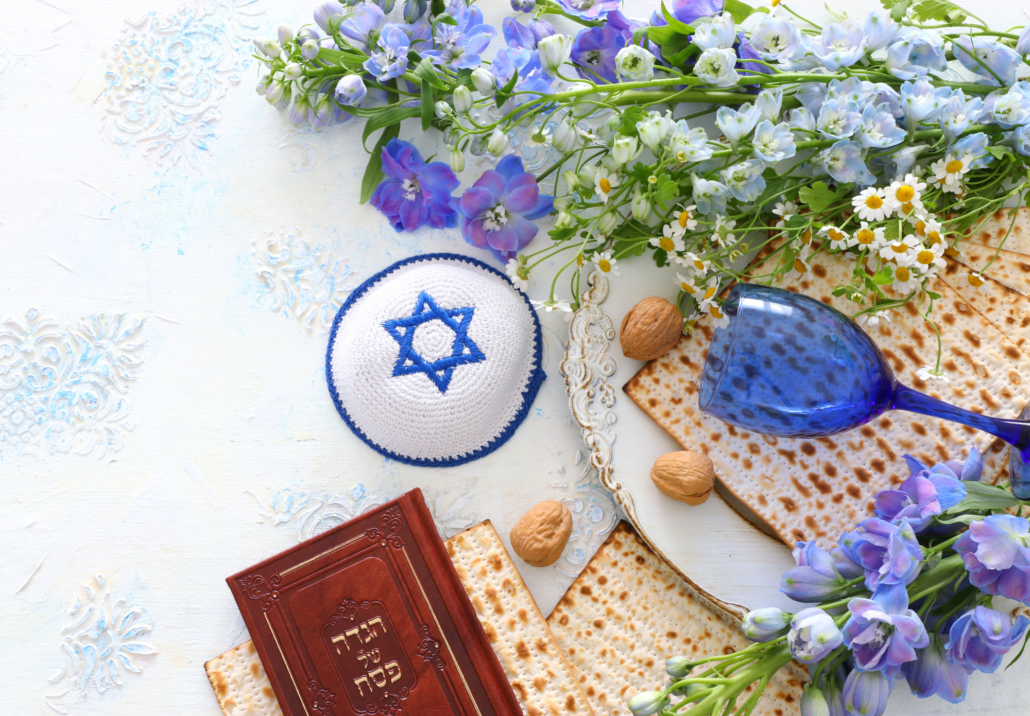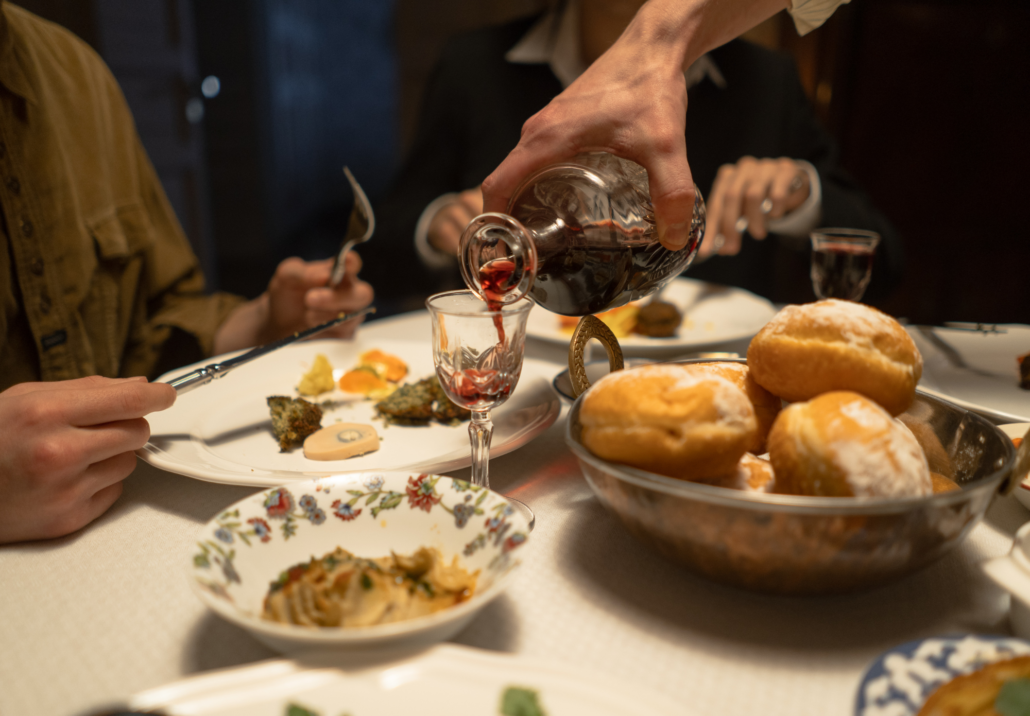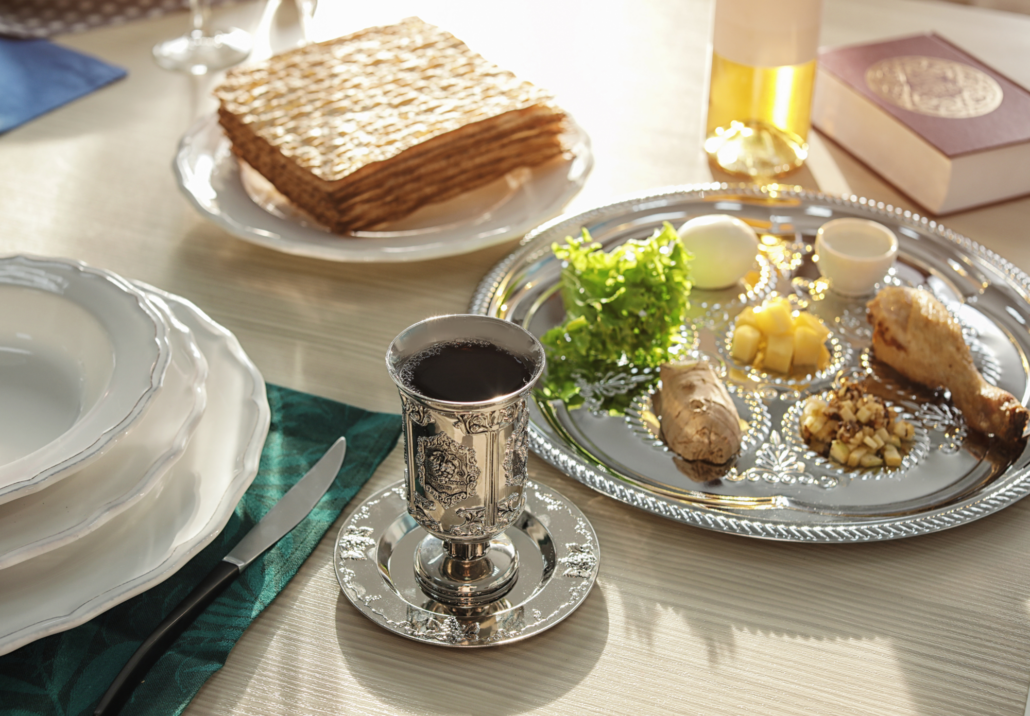As the soft winds of spring begin to stir the earth awake, I find myself reflecting on the duality of the season. It’s a time for renewal, for shedding winter’s weight, emotionally and spiritually, and leaning into hope. This year, I write to you from a deeper place of personal transition. Passover, a holiday rooted in faith and freedom, now holds new meaning for me. It speaks to the pain of estrangement, the weight of caretaking, and the promise of healing.

Introduction to the Jewish Holiday
Passover, also known as Pesach, is a significant Jewish holiday that commemorates the Israelites’ liberation from slavery in Egypt. This celebration of freedom, hope, and deliverance is widely observed by Jewish communities around the world. The Passover story, a powerful symbol of the Jewish people’s journey from slavery to freedom, is retold during the Passover seder, a special meal held on the first night of the holiday.
The seder table is set with symbolic foods, each representing key moments in the Exodus narrative. Unleavened bread, or matzah, symbolizes the haste with which the Israelites left Egypt, not having time to let their bread rise. Bitter herbs remind us of the bitterness of slavery, while a sweet mixture of apples and nuts, known as haroseth, represents the mortar used by the Israelites in their forced labor, sweetened to signify hope and resilience.
Passover is more than a historical recount; it is a celebration of freedom and a reminder of the enduring strength of the Jewish people. As families gather around the seder table, they engage in storytelling, song, and prayer, connecting with their heritage and passing down these traditions to future generations. This widely observed holiday is a testament to the power of hope and the unbreakable spirit of a people who have overcome great adversity.
The Story of Passover
Two thousand years before the birth of Christ, the biblical story of the Israelites as slaves in Egypt unfolds. Moses was a Jew, who was raised in the Egyptian Pharaoh’s household. He was determined to free his people who were in bondage for over 400 years. He went to Pharaoh and asked him to let his people go. The Pharaoh refused and as a punishment, God sent ten plagues upon the people of Egypt.
God told Moses to tell his people to sacrifice a lamb and splash its blood on the door of every Jewish person’s home. This was to show defiance of slavery and their faith in God. On the same night, the angel of death came to the door marked with blood and took the eldest son in each Egyptian family, sparing the Hebrew firstborn sons. It was the tenth and final plague.
The exodus from Egypt, marked by the miraculous parting of the Red Sea, is a cornerstone of the Passover celebration.
On the night of the full moon in Spring, the year Moses led the Jewish people out of Egypt to the land of Canaan (today known as Israel). They traveled for forty years, learned their lessons during the long and difficult journey, and founded the State of Israel.

The Significance of Passover
I believe Passover is the greatest event in Jewish civilization. It marks the Exodus, the miraculous journey from slavery in Egypt to freedom in the land of Canaan, now the modern State of Israel, when the Israelites were finally able to leave Egypt. The story is well known: after 400 years of slavery, Moses led the Israelites into the desert and toward a new beginning.
Passover, one of the most significant Jewish holidays, is not just a story but a symbol of hope, struggle, and strength that transcends generations. It represents freedom from oppression, faith in something greater than ourselves, and a future paved with hope.
Passover also symbolizes spiritual freedom, representing liberation from both physical bondage and the need for personal growth and self-improvement.
As a woman who has suffered through her own metaphorical enslavement, through grief, estrangement, and the all-consuming nature of caretaking, I now see the Passover story through a different lens. I see it as the beginning of personal healing.
Why Moses is My Hero
Moses, a man of courage and flaws, is one of my male heroes. My heart swells with pride when I think of him. Years ago, during my first grandson Robbie’s baby-naming ceremony, my daughter nudged me and asked, “Mom, what Hebrew name should I give him?”
Without missing a beat, I said, “Moses.”
Moses is central to the Exodus story, a narrative of liberation and faith that continues to inspire generations.
Moses represents freedom, yes, but also humility, strength, patience, and perseverance. On Robbie’s 21st birthday, I gifted him a money clip adorned with an Israeli coin depicting Moses carrying the Ten Commandments. A symbol of faith and legacy. And love.
Faith Through Contrast
My Hebrew name is Sarah, after the first Jewish woman to light the Shabbat candles. I was raised in a home where Judaism was honored, where Shabbat was sacred, and where my family history went back generations without intermarriage.
The rituals and customs of Passover are deeply rooted in Jewish tradition, reflecting the holiday’s connection to themes of liberation and resilience.
Yet, I’ve always been a woman of curiosity. I’m drawn to the American Indian spirit and everything French. While I don’t firmly believe in past lives, I have long felt, if they exist, I was once in Egypt, walking side-by-side with Miriam across the desert toward a promise of something better.
Oh, how I long for the promise of something better. Especially now, as I live through the estrangement from my adult daughters and the void of grandchildren I no longer get to hug, kiss, or spoil. Especially now, as I manage the quiet loneliness that comes with being a caregiver. The constant giving. The self-sacrifice.
Still, I hold onto my faith. Still, I dream of freedom.
The Emotional Bond to Israel
Israel has always held a place in my heart. Not only as a homeland but as a beacon of resilience. I love her sea, her olive trees, her ancient walls and modern hospitals, her beauty, her contradiction.
The Passover Seder and its symbolic foods narrate the Jewish people’s journey from slavery to freedom, engaging participants to reflect on their shared history and values.
Though I am not a deeply religious woman, I believe in tradition. I believe in the old rabbis’ wisdom and I believe in the strength of a people who wandered the desert for 40 years and still found the courage to hope. The spirit of Passover, I believe, is not just a Jewish celebration, but a universal reminder of freedom and faith.

The Jewish Community and Passover
Passover serves as a uniting force for the Jewish community, bringing together families and friends to celebrate this meaningful holiday. Across the globe, Jewish communities gather to hold Passover seders, share traditional foods, and retell the story of the Exodus. This celebration of Jewish heritage and tradition is a cornerstone of Jewish faith and identity.
In preparation for Passover, observant Jews meticulously clean their homes to remove all leavened products, known as chametz, and commit to eating only unleavened bread, or matzah, for the eight days of the holiday. This practice symbolizes the purity and readiness for a new beginning, free from the past’s burdens.
The Passover seder is a time for Jewish families to come together, reflect on the significance of the holiday, and pass down traditions and stories to future generations. It is a moment to honor the shared history and enduring values of the Jewish faith. As the youngest child at the table asks, “Why is this night different from all other nights?” the answer lies in the collective memory and the ongoing struggle for freedom and justice.
Passover is not just a celebration of the past; it is a living tradition that continues to inspire and unite Jews around the world today. It is a reminder of the strength found in community, the importance of faith, and the hope that guides us forward.
The Passover Seder
The celebration of Passover begins with the Seder meal, a symbolic dinner rooted in storytelling, song, and prayer. A sacred ritual that brings generations together around one table, binding them with memory and meaning.
The Seder meal is a time for community members to come together, reflect on the significance of the holiday, and support one another.
At the Seder table, the youngest asks, “Why is this night different from all other nights?” And oh, how I could answer that now, after all I’ve endured. It is different because it asks us to reflect. To teach our children the value of freedom, pass on our stories no matter how painful, and to celebrate even when our hearts are heavy.
One of the key rituals is the prohibition against eating chametz, which fosters a sense of unity and connection among Jewish families through shared customs.
The Seder is not just a ritual, it is a living conversation across time. As we dip herbs in salt water and taste the bitter bite of horseradish, we do not simply recall the suffering of our ancestors, but we are reminded of our own. The tears we have shed, the burdens we have carried and the prayers we have whispered in silence.
Yet, amid the sorrow, there is rejoicing because Passover, like life, is a paradox. It tells us: Yes, you were enslaved, but now you are free. Yes, you suffered, but still, you sing.
This is why we tell the story, year after year. So that we may never forget what it means to endure and what it means to overcome. This is why we ask the questions, even when there are no answers. This is why, despite estrangement, despite the empty chairs at our table, despite grief or distance or change, we show up. We keep the light alive.
The Seder Plate
During Passover, the Seder plate takes center stage; a sacred arrangement of symbolic foods that tells the ancient story of the Jewish people’s journey from slavery to freedom. It is more than tradition; it is a tangible expression of our shared history, of suffering and salvation, sorrow and sweetness. Each item placed upon the plate holds deep meaning, passed down through generations like treasured heirlooms of the soul. Together, they create a living tapestry of remembrance, resilience, and renewal. The avoidance of leavened bread during Passover is a powerful symbol of spiritual purification and renewal.
Each item on the Seder plate tells a piece of our story:
- Shank bone for sacrifice.
- A hard-boiled egg for the cycle of life.
- Parsley dipped in salt water for tears shed during slavery.
- Bitter herbs for the bitterness of slavery.
- Haroseth (blend of chopped apple, nuts, cinnamon, and grape juice) for the mortar used in Pharaoh’s bricks, sweetened to represent hope.
- Matzah, the unleavened bread, is the symbol of haste, of escape, of enduring struggle.
The prohibition against leavened foods serves to reinforce the historical and spiritual connections that Jewish families have with their ancestry and traditions.
Four cups of wine are poured for each promise of redemption:
- I will bring you out.
- I will deliver you.
- I will redeem you.
- I will take you to Me.
A Celebration in Brazil
One Passover, years ago, my Ultimate Concierge and I were in São Paulo, Brazil. A business trip fell over the first night of the holiday. We were invited to dinner by friends, Catholic friends, and I wasn’t expecting a Passover celebration. When we walked through their door, we were greeted with “Happy Passover!”
Passover celebrations are often enhanced by the presence of extended family, creating a deep sense of belonging and shared cultural experience.
There was matzah, matzo ball soup, kugel, leg of lamb, kindness and respect. It was a sacred night. A celebration of universal faith. A reminder that the essence of Passover, freedom, community, and remembrance, is not limited by faith. Passover in San Paulo will be an everlasting memory. A celebration of sincere friendship and respect for all religious beliefs.
Reclaiming Freedom
Passover is a time for asking ourselves how we’ve lived in oppression and how we can free ourselves. It may be the shackles of fear, the chains of silence, the weight of caretaking, the sting of rejection or the loss of motherhood as we knew it.
Passover reminds us that to live freely often comes with hardships and requires collective effort to overcome obstacles.
I believe the road to freedom begins with acceptance. Acceptance does not mean giving up. It means finding power in what remains. I’ve learned that grief, when embraced, becomes sacred. I have mourned the loss of my daughters. Of my grandchildren. Of a version of family I once knew. Now I seek new nests, new ways to give love, and new circles of trust.
A Message for You this Passover
To my fellow estranged mothers, grieving grandmothers, caregivers, and women navigating uncertain relationships: you are not alone. Passover reminds us of this one great truth: freedom comes from walking forward. Whether you’re sitting at a large family Seder or alone with a matzah cracker and a heart full of memories, know that you are seen.
Passover serves as a profound occasion for uniting Jews through shared traditions and rituals, reinforcing connections to heritage and community.
You are part of a long, brave lineage of women who have loved deeply, even when that love was not returned and that is the definition of strength. As we move through Passover and into Easter, I offer these words of renewal.
May you…
- Feel the warmth of renewal.
- Honor your wounds and find comfort in your scars.
- Walk out of your own Egypt, even if it takes you 40 years.
- Hold space for hope, but build a life on what is.
- Find freedom in faith, in friendship, and above all, in yourself.
As the second night of Passover arrives, may you continue to find strength and hope in the traditions that unite us.
Happy Passover! Tell me, darlings: What does Passover mean to you this year? Let’s reflect together in the comments.



I am not Jewish, but have been told about Passover, I always thought the blood of the lamb was put over the israelites doors to get the angel of death to pass over their doors, thanks for explaining now I know it wasn’t the isrealites doors it was put over but was put over the egyptian’s doors
Isn’t knowledge great! We never stop learning. Warmly, Honey
Honey,
I look forward each week to your story. They always touch my heart. In June I will become a grandmother, of a granddaughter who will be both Jewish and Catholic. I am more of a spiritual person than religious. I’m praying that this child just grows up accepting people of all backgrounds. It is important to be taught kindness and love along with the history of both religions , not choosing one over the other or none at all. I keep out of things because it is not my place to say. I leave it in Gods hands! Wishing you and your family a wonderful Passover
Lisa
Thank you Lisa for reading my Sunday Story each week. I agree with you that you should not become involved with the decision made by the parents. I also agree that your grandchild should grow up accepting people of all religions and backgrounds. I also believe children need direction. I wish you much happiness on becoming a new grandma. Congratulations. Warmly, Honey
For Catholics the Passover is the meal Jesus shared with his apostles. He was an observant Jew. He chose that meal to reveal to the apostles His coming sacrifice on the cross. Our faiths are rooted together and even in Catholic school I was taught that the Jews are the chosen people of God. Enjoy your holiday!
Thank you for your lovely note. We are rooted together in so many ways and I am glad. Enjoy Easter. Warmly, Honey
This is a great article. Thanks for sharing.
I trust you have had a peaceful Passover
Hugs Irene
I am glad you enjoyed the article. Yes, we did. We were suppose to spend the evening with my husband’s family but I came down with a cold, cough and was losing my voice. We spent the evening together and together is what counts. Warmly, Honey
What a beautifully written piece. Thank you, Honey! On this first night of Passover my husband and I will be alone. We will have our own seder because it is such an important part of our life. In the second night we will be with a few family members. At this time of year I always think about those who used to be at our seder: grandparents, parents ( all are gone now), cousins, and extended family of my dad’s. I am reminded however, how lucky we are to be able to celebrate with each other! Happy Passover to you and yours.
I enjoyed your message very much. I feel the same. We were set to spend Passover with our family on my husband’s side. I was so excited and then…I really got sick and and sick today and we had to cancel. We spent the night as you did. As long as we were together we felt blessed and happy. Happy Passover. Warmly, Honey
Thank you with love
You are very welcome, with love. Warmly, Honey
I’m Jewish, having lost my daughter and 3 beautiful Grandchildren… I know how painful each day is. It’s been 5 years now! Not a day goes by that I don’t think of them and wish I could just reach out. You have given me hope once again, I do pray that one day just maybe I will be able to see or hear from them again. It’s so difficult to be a caretaker, loss your parents now your daughter. One day there will be healing. I am most grateful for my loving son who always brings a loving smile and much laughter to me. Shalom beautiful lady!
Hi Karin. You are fortunate to have your loving son. Revel in positives. You cannot make your daughter do not want she does not want to do. Reconciliation is in her hands. What is in your hands- I believe you should surrender to her toxicity and replace your sad thinking with doing something positive and you enjoy with ‘your’ life. I am trying to do that. Let’s do it together. Warmly, Honey
You have such a gentle spirit, Honey. Thank you for sharing with us.
One small correction. According to Exodus 12:13, you will see that the blood on the posts was on the Israeli’s homes so that when the angel of death came, it would pass over those homes, thus saving all the first born Israeli males from death. This was the final plaque, when there was so much Egyptian weeping, that Pharaoh finally let the people go.
I know and made a mistake. Thank you for seeing my error. Being corrected. If you are a Jewish woman, Happy Passover. If you are of another faith, Happy Easter. Warmly, Honey
Your daughter is not dead ……. Always hope for reconciliation, forgiveness on both sides, etc.
God is good!
You certainly have had some wonderful life experiences.
Grateful for your sharing.
I do hope. God is good. I have had many wonderful experiences and many with my daughters. Take care. Warmly, Honey
Thank you Honey for sharing in detail how Passover is celebrated by the Jewish faith. I have never been invited to a Seder – But it seems soo very meaningful, beautiful and eternal. I’m caretaker for my husband of 83 and at my age of 66 it is so difficult to see a bright future ahead of us like we imagined in retirement…. Your beautiful writing about Passover lifted my spirit to
have more faith and resilience to move forward and accept the loss of our dreams and find a new positive pathway forward for both of us. Thank you dearest
You are wise. Now you must act upon your wisdom. Warmly, Honey
Hi Honey,
Many thanks for your beautiful Passover thoughts, some of them sad, most of them informative and heartfelt.
It made me feel as if I, personally, was with you on this special holiday.
I and my family celebrate it where we live, here in Israel, high up on my daughter’s kibbutz in the north. Your thoughts always give me strength and hope. I wish you a continued happy holiday
season and, most importand, a reconciliation with your daughters.
Love you.
Laura
My dream is to live in Israel for a time. Please tell me about your life on the Kibbutz, your town, and your family. I am so interested. How did you find Honeygood.com? Shalom- Honey